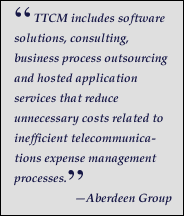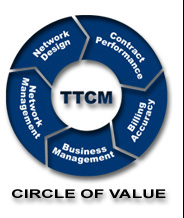




TTCM Savings Area:
Automating TeleManagement
Published In: Volume
3 Issue 3
Date: July,
2004
|
If you follow the publications of industry analysts like Gartner, MetaGroup, Aberdeen and others, outsourcing telecom management is a highly viable option for companies to pursue. The premise is that outsourcers have the systems, the people and the experience to perform certain tasks more efficiently, which frees the enterprise to concentrate on its core competency. This can be seen as very true in theory, and while we don't know if Yankees manager Yogi Berra knows the first thing abut telecom, he provides some applicable insight into theory versus practice:
Whether or not
outsourcing is right for your company depends on a number of factors,
not the least of which is what your definition of outsourcing includes. Monolithic vendors of telecom outsourcing like EDS, Wipro, etc. offer entire network outsourcing, including human capital and leaseback of all capital assets. The Fortune 250 are the primary targets, as contracts in this space can total hundreds of millions of dollars annually. On the other end of the spectrum are companies that provide outsourcing services but do not take responsibility for running the network. Auditors, invoice payment companies, and consultants operate in this space.
The emerging trend of the past few years involves yet a third hybrid option, bringing an "outsourced" software application inside the enterprise, giving a company increased capability to manage its own telecom environment. This software can even be supplemented with ongoing services such as validated bill payment, but it leaves the information and critical network management processes in the hands of the enterprise. Whatever level of outsourcing you might consider, a few driving criteria seem to affect the decision.
Culture: Whether or not your company opts for outsourcing services is often a function of corporate culture. Three large US banks recently took totally opposite positions. One chose to purchase a full-featured telemanagement software platform and continue to direct telecom internally. The other chose to outsource all bill process, audit and payment functions to a third party, but retain the network control. The third handed over the whole IT/telecom department to a third party outsourcer. While these companies' size and needs were similar, the CIO of one bank was culturally biased to total outsourcing while the others wanted more internal connections and controls. Core Competency: Often, the outsourcing decision boils down to the issue of core competency. If you make and sell dairy products, a data/voice network can be considered outside of your core competency, and companies may choose to offload this function to avoid the cost of maintaining internal expertise. If you run a large data or call center. However, that may not be true. Companies that consider telecom "critical" even if not core, often prefer to keep management of the network internal to increase information availability and controls. Financial Flexibility: Some companies choose to outsource so they can move the costs around on their financials. Outsourcing converts fixed costs into variable costs; it releases capital for investment elsewhere in the organization and facilitates a way to avoid large expenditures. If the shift also lowers total costs, so much the better, although this outcome is often very difficult to determine.
When companies choose to outsource select components rather then the whole, the transition is seldom cataclysmic. An example would be outsourcing just the bill validation and payment functions while maintaining the network management internally. But it is important to understand the ramifications of any choice, even a basic one. Assuming that the ROI for outsourcing to improve business process efficiencies is positive, can you fully predict all the subsequent changes that will inevitably follow? The "Law of Unintended Consequences" has historically shown that every change has some unexpected outcome. While the surprise can sometimes be a good one, you must protect yourself from the bad ones where all the risk lies. With telecom bill payment outsourcing, we have seen that the biggest change comes from a shift in access to information and network knowledge. Since companies are dependent upon their networks they are equally dependent upon the information required to manage that network. With elimination of internal bill processing, one of the key sources of information can be reduced, unless your provider can demonstrate that you will receive equivalent or even superior information to what you currently have.
Determining your preferred route is the task at hand. For companies with solid telecom teams and processes, the choice may be to keep doing what they're doing. For most companies, however, it makes sense to at least explore the options. By doing so, you can always defend your choices to upper management and assure them you are on the best path for your organization.
©2004,
TelAssess, Inc. All rights reserved. |
![]()
©2004, TelAssess 800.657.1595
Designed by Stylus
Designs
